第十一章 汉诗英译中的炼词my version
- 格式:doc
- 大小:91.50 KB
- 文档页数:10
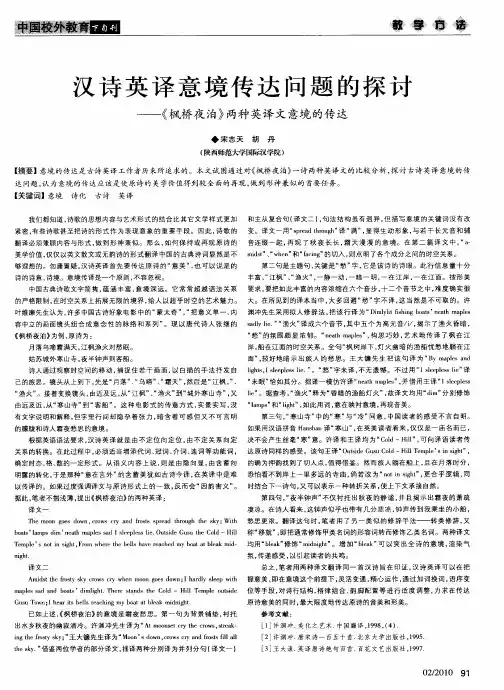
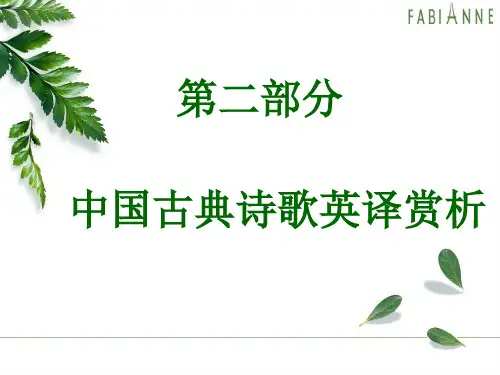
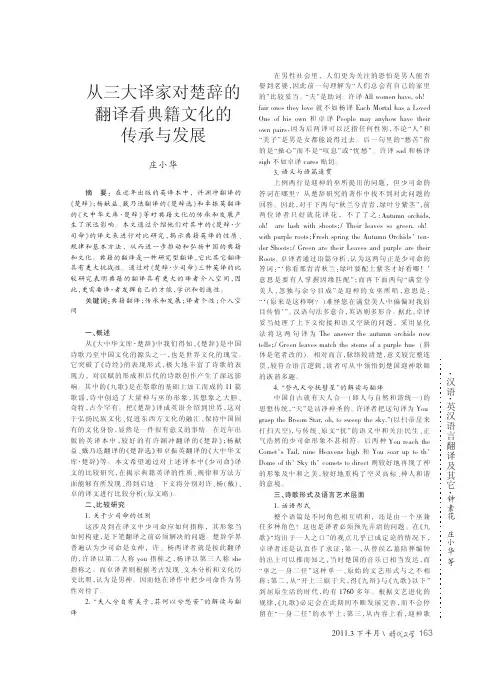
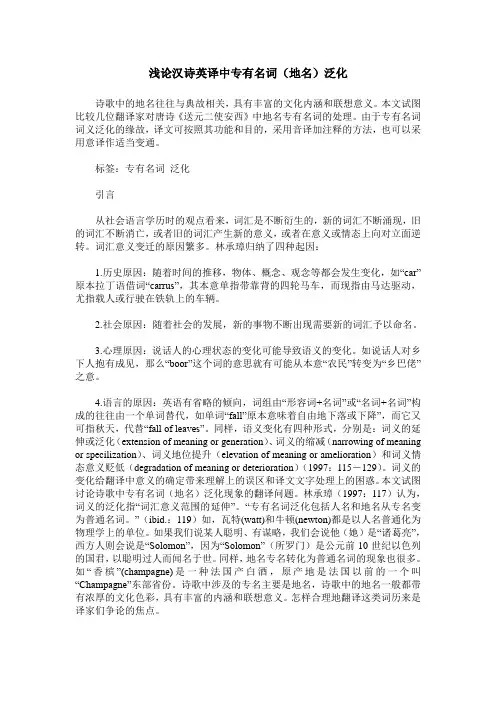
浅论汉诗英译中专有名词(地名)泛化诗歌中的地名往往与典故相关,具有丰富的文化内涵和联想意义。
本文试图比较几位翻译家对唐诗《送元二使安西》中地名专有名词的处理。
由于专有名词词义泛化的缘故,译文可按照其功能和目的,采用音译加注释的方法,也可以采用意译作适当变通。
标签:专有名词泛化引言从社会语言学历时的观点看来,词汇是不断衍生的,新的词汇不断涌现,旧的词汇不断消亡,或者旧的词汇产生新的意义,或者在意义或情态上向对立面逆转。
词汇意义变迁的原因繁多。
林承璋归纳了四种起因:1.历史原因:随着时间的推移,物体、概念、观念等都会发生变化,如“car”原本拉丁语借词“carrus”,其本意单指带靠背的四轮马车,而现指由马达驱动,尤指载人或行驶在铁轨上的车辆。
2.社会原因:随着社会的发展,新的事物不断出现需要新的词汇予以命名。
3.心理原因:说话人的心理状态的变化可能导致语义的变化。
如说话人对乡下人抱有成见,那么“boor”这个词的意思就有可能从本意“农民”转变为“乡巴佬”之意。
4.语言的原因:英语有省略的倾向,词组由“形容词+名词”或“名词+名词”构成的往往由一个单词替代,如单词“fall”原本意味着自由地下落或下降”,而它又可指秋天,代替“fall of leaves”。
同样,语义变化有四种形式,分别是:词义的延伸或泛化(extension of meaning or generation)、词义的缩减(narrowing of meaning or specilization)、词义地位提升(elevation of meaning or amelioration)和词义情态意义贬低(degradation of meaning or deterioration)(1997:115-129)。
词义的变化给翻译中意义的确定带来理解上的误区和译文文字处理上的困惑。
本文试图讨论诗歌中专有名词(地名)泛化现象的翻译问题。
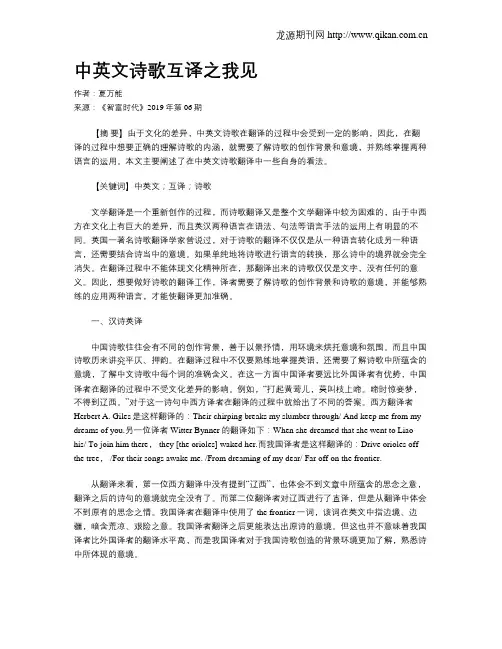
中英文诗歌互译之我见作者:夏万能来源:《智富时代》2019年第06期【摘要】由于文化的差异,中英文诗歌在翻译的过程中会受到一定的影响,因此,在翻译的过程中想要正确的理解诗歌的内涵,就需要了解诗歌的创作背景和意境,并熟练掌握两种语言的运用。
本文主要阐述了在中英文诗歌翻译中一些自身的看法。
【关键词】中英文;互译;诗歌文学翻译是一个重新创作的过程,而诗歌翻译又是整个文学翻译中较为困难的,由于中西方在文化上有巨大的差异,而且英汉两种语言在语法、句法等语言手法的运用上有明显的不同。
英国一著名诗歌翻译学家曾说过,对于诗歌的翻译不仅仅是从一种语言转化成另一种语言,还需要结合诗当中的意境。
如果单纯地将诗歌进行语言的转换,那么诗中的境界就会完全消失。
在翻译过程中不能体现文化精神所在,那翻译出来的诗歌仅仅是文字,没有任何的意义。
因此,想要做好诗歌的翻译工作,译者需要了解诗歌的创作背景和诗歌的意境,并能够熟练的应用两种语言,才能使翻译更加准确。
一、汉诗英译中国诗歌往往会有不同的创作背景,善于以景抒情,用环境来烘托意境和氛围。
而且中国诗歌历来讲究平仄、押韵。
在翻译过程中不仅要熟练地掌握英语,还需要了解诗歌中所蕴含的意境,了解中文诗歌中每个词的准确含义。
在这一方面中国译者要远比外国译者有优势,中国译者在翻译的过程中不受文化差异的影响。
例如,“打起黄莺儿,莫叫枝上啼。
啼时惊妾梦,不得到辽西。
”对于这一诗句中西方译者在翻译的过程中就给出了不同的答案。
西方翻译者Herbert A. Giles是这样翻译的:Their chirping breaks my slumber through/ And keep me from my dreams of you.另一位译者Witter Bynner的翻译如下:When she dreamed that she went to Liao-his/ To join him there, they [the orioles] waked her.而我国译者是这样翻译的:Drive orioles off the tree, /For their songs awake me. /From dreaming of my dear/ Far off on the frontier.从翻译来看,第一位西方翻译中没有提到“辽西”,也体会不到文章中所蕴含的思念之意,翻译之后的诗句的意境就完全没有了。
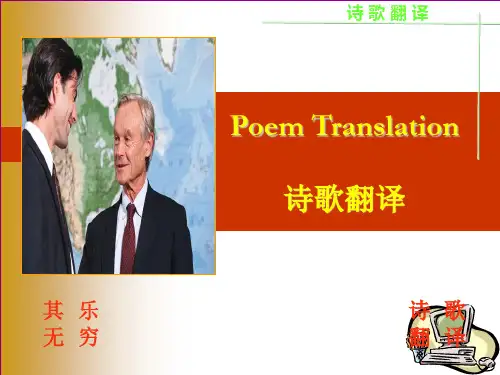
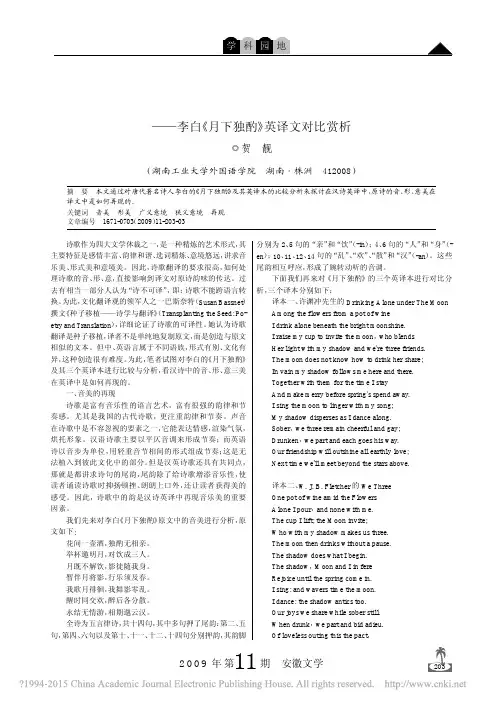
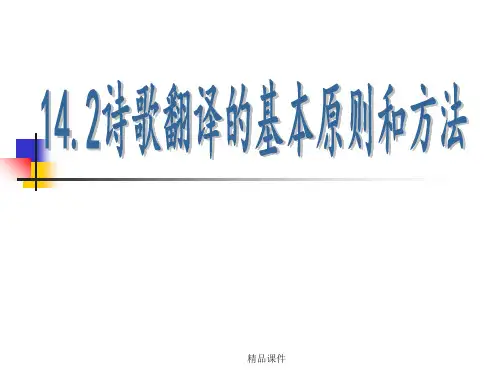
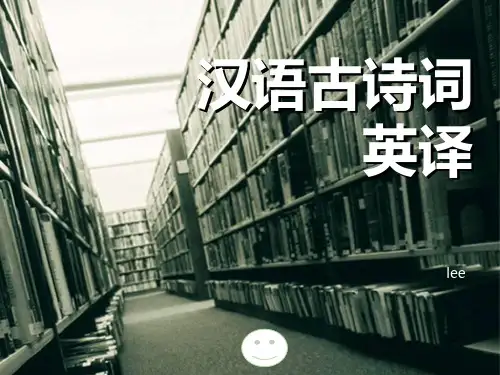
![[英语学习]从中英文诗歌翻译看中英文措辞](https://uimg.taocdn.com/6eaa1fc95727a5e9846a61d9.webp)
从中英文诗歌翻译看中英文措辞诗歌被誉为一个民族文化的结晶和最高体现,同时诗歌也是时代、历史文化沉淀的结果。
中西方诗歌迥然不同,分别体现了中西方的文化、艺术、美学、文论的综合成就。
对中西诗歌进行比较既是文化交流的客观必要,也是研究和发展我国诗歌的主观要求。
译诗难,译中国古诗更难。
对如何译诗各派也是各陈己见,各抒其理,智者见智仁者见仁。
而郭沫若提出的“以诗译诗”及闻一多所说的“诗笔”译诗,更是成了诗歌翻译的一种准那么。
写诗讲究“音形译”三美,译诗就不可只满足于达意,必须力求传神,保存诗的艺术性,音形意三者均美。
成仿吾曾说过,“译诗也应当是诗,这是我们所最不可忘记的,其次,译诗应当忠于原作。
”(《译诗论》)傅雷曾说“即使是最优秀的译文,其韵味较之原文仍不免过或不及。
翻译时只能尽量缩短这个距离,过那么求其勿太过,不及那么求其勿过去不及。
”(X靖之主编的《翻译论集》)。
翻译的目的应该是促进文化交流,使两个文化都得到提高。
中国的诗韵早已具备,即使免韵是现代英诗写作的主流,但翻译中国古典诗词时,若能以格律诗译格律诗,既讲究格律又无损原意,仍当属上乘。
以下是中国古诗《静夜思》的两种英译。
原作:静夜思 -(唐)李白床前明月光,疑是地上霜。
举头望明月,低头思故乡。
译作1:Thoughts in a Tranquil Night(Tr. L. Cranmer-Byng)Athwart the bedI watch the moonbeams cast a trailSo bright, so cold, so frail,That for a space it gleamsLike hoar-frost on the margin of my dreams,I raise my head,The splendid moon I seeThen droop my head,And sink to dreams of theeMy fatherland, of thee!译作2:Nostalgia (Tr.翁显良)A splash of white on my bedroom floor. Hoarfrost?I raise my eyes to the moon, the same moon.As scenes long past come to mind, my eyes fall again on the splash of white,and my heart aches for home.Cranmer-Byng 采用自由体译诗,直抒胸臆,情感奔放,创造性强,读来让人想起的不是李白,而是西方某位诗人。
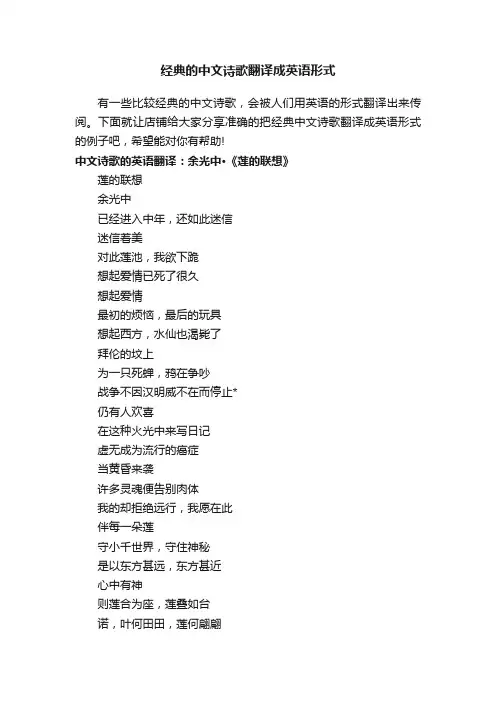
经典的中文诗歌翻译成英语形式有一些比较经典的中文诗歌,会被人们用英语的形式翻译出来传阅。
下面就让店铺给大家分享准确的把经典中文诗歌翻译成英语形式的例子吧,希望能对你有帮助!中文诗歌的英语翻译:余光中·《莲的联想》莲的联想余光中已经进入中年,还如此迷信迷信着美对此莲池,我欲下跪想起爱情已死了很久想起爱情最初的烦恼,最后的玩具想起西方,水仙也渴毙了拜伦的坟上为一只死蝉,鸦在争吵战争不因汉明威不在而停止*仍有人欢喜在这种火光中来写日记虚无成为流行的癌症当黄昏来袭许多灵魂便告别肉体我的却拒绝远行,我愿在此伴每一朵莲守小千世界,守住神秘是以东方甚远,东方甚近心中有神则莲合为座,莲叠如台诺,叶何田田,莲何翩翩你可能想象美在其中,神在其上我在其侧,我在其间,我是蜻蜓风中有尘有火药味。
需要拭泪,我的.眼睛十一月十日* 汉明威,有版本为海明威。
Associations of the LotusYu Kwang-chungStill so credulous am I, now young no more, So credulous ofBeauty. I wish to kneel to the lotus pond. Now long have died the ecstasies of love. Ah, love and love –That last of toys, and first of annoys.Now Narcissus dies thirsty in Greece:On Byron’s tombCrows are quarreling over a dead cicada. War stops not at Hemingway’s death.Still men are fondOf writing their diaries in the light of Mars.A fashionable cancer is Nihilism.When evening comes,Many a soul takes leave of its flesh.Yet mine divorces me not. Here it stays With every lotus,Watchful over its cosmos and mystery. And all at once very near and far is the East. With Buddha in you,The lotus flowers form a divine seat.Look! Graceful are the flowers, cool the leaves!You can visualizeBeauty within them, and Deity above,And me beside, and me between, I’m the dragon-fly.Dust is in the wind,And powder. They need wiping, my weeping eyes.中文诗歌的英文形式:徐志摩·《我有一个恋爱》我有一个恋爱;——我爱天上的明星;我爱他们的晶莹:人间没有这异样的神明。
中国文学作品英译名词典A【阿Q正传】The True Story of A Q【哀歌】elegy【《哀江南赋》】Lament for the South【爱情喜剧】romantic comedyB【八股】eight-part essay ( a literary composition prescribed for the imperial civil service examinations, knows for it rigidity of form and poverty of ideas )【白话诗】free verse written in vernacular【白话文】writings in vernacular【《白话文学史》】History of Vernacular Literature【白描】simple, straightforward style of writing【《白香词谱笺》】A Collection of Tunes of Ci Poems【百花齐放,推陈出新】Let a hundred flowers blossom, weed through the old to bring forththe new【百花齐放,百家争鸣】Let a hundred flowers blossom and a hundred schools of thoughtcontend【报告文学】reportage【《暴风骤雨》】The Hurricane【暴露文学】literature of exposure【悲剧性缺陷】tragic flaw【笔记小说】literary sketches; sketch-book【边塞诗】frontier-style poetry【扁平人物】flat character【变文】bianwen (form of narrative literature flourshing in the Tang Dynasty, with alternate prose and rhymed parts for recitation and singing, often on Buddhistic themes )【表现手法】technique of expression【柏拉图式恋爱】Platonic loveC【才子佳人】gifted scholar and beautiful woman ( a term usually used to refer to ideallovers in Chinese romance )【《采莲赋》】Lotus Gathering【《蔡文姬》】Cai Wenji【《沧浪诗话》】Cang Lang's Notes on Poets and Poetry【《茶馆》】Teahouse【长短句】a kind of classical poetry consisting chiefly of seven-character linesinterspersed with shorter or longer ones【《长干行》】The Trader's Wife【《长恨歌》】Song of Enduring Sorrow;A Song of Everlasting Sorrow【《长生殿》】Palace of Eternal Youth; The Longevity Hall【畅销书】best-seller【衬托】to make...stand out in high relief【衬字】extra word inserted in a line of verse for balance or euphony【《赤壁赋》】Song of the Red Cliff【《出师表》】Memorial on Sending Out the Troops【《初学记》】The Primary Anthology【《楚辞》】Chuci; Elegies of Chu; Songs of Chu【传奇】legend; short stories of the Tangand Song dynasties【传奇小说】romantic novel【《创业史》】The Builders【创造社】Creation Society【创作思想】ideas guiding creation in literature and art【创作源泉】fountain-headofliteraryand artistic creation【《春蚕》】Spring Silkworms【《春灯谜》】Spring Latern Riddles【《春风沉醉的晚上》】intoxicating Spring Nights【《春江花月夜》】Spring, the River, Flowers, the Moon: night;The River On a Spring Night【春柳社】Spring Willow Society【《春秋》】The Spring and Autumn Annals【纯文学】balles-letters【《辍耕录》】Talks in the Intervals of Ploughing【词】ci poetry (written to certain tunes with strict tonal pattens and rhyme schemes, in fixed numbers of lines and words originating in the Tang Dynasty and fully developed in the Song Dynasty )【词调】tonal patterns and rhyme schemes of ci poetry【词牌】tune; names of tunes of ci poems【《词谱》】A Collection of Tunes of Ci Poems【词曲】general term for ci and qu【《词源》】The Origin of the Ci Poetry【词韵】rhyme of ci poemsD【打油诗】doggerel; ragged verse【大场剧场】public theaters【《大风歌》】Song of the Great Wind【大墙文学】prison literature【《大学》】The Great Learning【大众化】popular; in a popular style【《当代》】Contemporary Literature【《道德经》】The Scripture of Ethics; The Way and Its Power【道德含义】moral meaning【倒叙】flashback【地方出版物】samizdat【地方色彩】local colour【地方小说】regional novel【典型环境】typical environment【典型人物】typical person【典型形象】typical image【典型性】typicality【典型性格】model personalities【电影理论】film theory【叠句】reiterative sentence【叠韵】two or more characters with the same vowel formation【叠字】reiterative locution【动物寓言故事】beast fable【《窦娥冤》】The Injustice Done to Dou E【读者反应批评】reader-response criticism【对联】couplet written on scrolls【多重含义】multiple meaningE【俄国形式主义】Russian Formalism【《儿女英雄传》】The Story of the Hero and The Sisters; Two Sisters Marry the Same Man【儿童文学】children's literature【《儿童文学研究》】The Study on Children's Literature【《而已集》】And That's that【《尔雅》】Literary Expositor【《二刻拍案惊奇》】The Second Collection of Striking the Table in Amazement at theWonders【《二十年目睹之怪现状》】Odd Things Witnessed Over Twenty Years; Having Seen Strange PresentConditions for Twenty Years【《二十四诗品》】The Twenty-Four Moods of Poetry【二十四史】the Twenty-Four Histories (dynastic histories from remote antiquity till the Ming Dynasty)【二为方向】literature and art following the two directions of being for serving the people and for serving socialism【《二心集》Two HeartsF【反面人物】negative character【反现实主义小说】antirealistic novel【反映现代生活】to reflect present-day life【反映现实生活】to reflect real life【《飞燕外传》】The Private Life of Lady Swallow【非传统英雄式的主人公】anti-hero【非理性主义】irrationalism【非虚构小说】nonfiction novel【非正式出版物】underground literature【肥皂剧】soap opera【风骨】strength of character; vigour of style【风景诗】topographical poetry【风骚】literary excellence; coquettish【《凤凰涅磐》】The Nirvana of the Phoenix【《封神演义》】Canonization of the Gods; Gods and Heroes; Investiture of the Gods 【讽刺喜剧】satirical comedy【讽刺作品】satire【丰富的表现能力】rich expressive power【《枫桥夜泊》】To Moor at Night at the Maple Bridge【《芙蓉镇》】A Small Town Called Hibiscus【《腐蚀》】Decay【赋】fu;descriptive prose interspersed with verse; prose-poetry【复仇悲剧】revenge tragedy【《浮生六记》】Six Chapters of a Floating LifeG【干预生活】interventing in life【感伤小说】senimental novel【高大全】tall, big, and perfect ( the nonexistent divorced-from-realistic-life, "heroic" figures fabricated in certain literary and art works along theGang-of-Four's theory of literature and art during the Cultural Revolution【格律诗】regulated verse【革命的政治内容和尽可能完美的艺术形式的统一】unity of revolutionary political content and highestpossible perfection of artistic form【革命斗争小说】novels and novelettes on revolutionary struggle【革命文学】revolutionary literature【革命戏剧】revolutionary drama【革命现实主义】revolutionary realism【革命现实主义和革命浪漫主义相结合】combining revolutionary realism with revolutionary romanticism【革命样板戏】revolutionary model theater【歌颂工农兵英雄】enlogizing worker, peasent and soldier heroes【歌颂光明】enlogizing what is bright【歌行】a poem that can be set to music and song【《隔帘花影》】Flower Shadows on the Screen【工人文学】arbeiter literature【功利主义艺术观】vtilitarianism of art【宫体诗】palace-style poetry【宫廷作家】courtly makers【古代文学】ancient literature【古典悲剧】classical tragedy【古典文学】classical literature【《古今谭概》】A Chat about the Present and the Past【《古今小说》】The Ancient and Modern Stories【古今之争】quarrel at the ancients and moderns【《古诗源》】The Wellsprings of Old Poems【古体诗】gutishi; ancient style poetry ( a form of pre-Tang poetry, usu. having five or seven characters to each line, without strict tonal patterns or rhyme schemes【古为今用,洋为中用】make the past serve the present and foreign things serve China【古文】1. prose written in the classical literary style2. ancient Chinese prose3. Chinese script before the Qin Dynasty【《古文观止》】The Finest of Ancient Prose【古文运动】Ancient-Style Prose Movement【《古小说钩沉》】Ancient Stories Salvaged【《故事新编》】Old Tales Retold; Old Stories Retold【故事中的故事】story whthin a story【《官场现形记》】Revealing Original Shape in Officialdom; Bureaucrats Shown Up 【《管锥编》】The Pipe and Awl Collection; Perspectives on Literature【《归去来辞》】On Returning Home; The Return【闺怨诗】boudoir-plaint poetry【国粹】quintessence of the Chinese culture【《国殇》】The Ode to the Fallen【《国语》】Guoyu; Conversations from the States; Discourse on the StatesH【《海上花列传》】Lives of Shanghai Singsong Girls【海外奇谈】tall tale【《汉宫秋》】Sorrow in the Han Palace【《汉书》】The History of the Han Dynasty; Book of Han;Chronicles of the Han Dynasty【《好逑传》】The Fortunate Union【合声】improptu verse【《荷花淀》】Lotus Creek【荷花淀派】Lotus Lake School【黑色幽默】black humour【《红高梁》】Red Sorghum【《红楼梦》】A Dream of Red Mansion; Dream of the Red Chamber【红学】redology【《呼兰河传》】The History of Hulan River【《胡笳十八拍》】Barbarian Reed-Whistle Song in Eighteen Stanzas;Eighteen Verses Sung to a Barbarian Whistle【《华盖集》】Bad Luck【《花边文学》】Fringed Literature【滑稽讽刺作家】burlesque【《红旗谱》】Keep the Red Flag Flying【《红岩》】Red Crag【后现代主义】post modernism【厚今薄古】paying more attention to the present than to the past【话本】script for story-telling; text of a story【话本小说】story-tellers scripts【话剧】modern drama【《淮南子》】Writings of Prince Huainan【《幻灭》】Disillusion【《黄河东流去》】The Yellow River Flows East【《黄鹤楼送孟浩然至广陵》】Seeing Meng Haoran off to Yangzhou from Yellow Crane Tower【荒唐故事】cock-and-bull story【回忆录】reminiscences【活报剧】skit; street performanceJ【《激流三部曲》】The Torrent Trilogy【及时行乐】carpe diem【《家》】The Family【家庭悲剧】domestic tragedy【加强艺术感染力】to intensity the impact of the art【《翦灯新话》】New Stories Written While Trimming the Wick【建安七子】seven leading writers during the Jian An Period at the end of the Han Dynasty ( Kong Rong, Chen Lin, Wang Can, Xu Gan, Ruan Yu, Ying Yang, and Liu Zhen )【建国后文学】literature after founding of the P.R.C【间谍小说】spy novel【教诲文学】didatic literature【结构谨严】(with) a tightly-knit structure(plot)【结构主义批评】structuralism Criticism【接受美学】reception-aesthetic【《今古奇观》】Wonders of the Present and the Past【《金光大道》】The Bright Road【《金瓶梅》】The Golden Lotus; Gold Plum Vase; The Plum in the Golden Vase 【《锦瑟》】The Richly Painted Zither【近代文学】modern literature【近体诗】modern style poetry ( a refernce to innovations in classical poetry during the Tang Dynasty, marked by strict tonal patterns and rhyme schemes )【《京本通俗小说》】Popular Stories from Capital Editions【经济建设小说】novels and novelettes on economic construction【《警世通言》】Convincing Arguments Warning the World; Comprehensive Words toAdmonishthe World【《镜花缘》】Romance of the Mirrored Flowers【精神分析学文艺批评】psychoanalysis criticism【精神生活】spiritual life【《静夜思》】In the Quiet Night【《九歌》】Nine Odes; None Songs【《九尾龟》】None-Tailed Tortoise【《九章》】The nine Elegies; The Nine Songs【旧诗】old-style poetry; classical poetry【《旧文四篇》】Four Essays of Yesterday【《救风尘》】The Rescue of a Courtesan【救世主形象】christ figure【俱象诗】concrete poetry【绝句】jueju, poem of four lines, each containing five or seven characters, with a strict tonal pattern and rhyme scheme【《绝妙好词》】Excellent Lyrics【军事小说】military novels and novelettesK【客观对应物】objective correlative【客观批评】objective criticism【科学幻想小说】science fiction; fantasic fiction【《孔雀东南飞》】Southeast Fly the Peacocks【口头流传】oral transimission【口头文学传统】oral tradition【《苦菜花》】Bitter Herb【夸张】to exaggerate【《狂人日记》】A Madman's DiaryL【《兰亭集序》】Preface to the Orchid Pavilion Collection【浪漫主义悲剧】romantic tragedy【浪漫主义批评理论】romantic criticism【浪漫主义时期】romantic period【《老残游记》】The Travels of Lao Can【《雷雨》】Thunderstorm【类型化人物】type character【理论斗争】theoretical struggle【理性时代】age of reason【《礼记》】The Book of Rites; The Book of Ceremonies and Proper Conduct 【《李有才板话》】Rhymes of Li Youcai【离奇故事】tall story【《离骚》】Li Sao; The Lament; Encountering Sorrow【历史小说】historical novel【恋母情结】Oedipus complex【连载小说】serial story【联句】parallel phrases【《聊斋志异》】Strange Tales of Liao-Zhai; Strange stories from a Chinese Studio; 【《列子》】The Works of Liezi【《林海雪原》】Tracks in the Snow Forest【《林家铺子》】The Shop of Lin Family【《六十家小说》】Sixty Stories【六言诗】poems in six-word verse【《龙须沟》】Dragon Beard Ditch【《陋室铭》】On My Modest Room【鲁迅研究会】Society for the Study of Lu Xun【《吕梁英雄传》】Heroes of the Lu Liang Mountain【律赋】regulated prose-poem【律诗】lushi; a poem of eight lines five or seven characters in each line【伦理的批评】ethic criticism【《论契合》】Degrees of Affinity: Studies in Comparative Literature【论说文】argumentative prose【《论语》】The Analects of Confucius; Analects【《洛神赋》】On the Goddess of Luo River【《骆驼祥子》】Camel Xiangzi; The Ricksha BoyM【马克思主义文学批评】Marxist criticism【冒险小说】novel of adventures【梦幻体】dream vision【美学批评】aesthetic criticism【朦胧诗】obscure poetry; "murky" poetry【《孟子》】Mencius; The Book of Mencius; The Works of Mencius【迷语】riddle【描写阴暗面】description on dark-side【民间歌谣】popular ballad【民间故事】folk tale; folklore【民间文学】folk literature【民族遗产】national legacy【《墨池记》】The Ink Pond【魔幻现实主义】magic realism【木偶剧】pupppet show【牧歌】pastoral【《牡丹亭》】The Peony PavilionN【《呐喊》】Call to Arms【《南腔北调集》】Mixed Dialects【内容和形式的统一】unity of content and form【内心独白】interior monologue【浓厚的中国民族特色】rich Chinese national colour【女才子】bluestockings【《女神》】The GoddessesP【《拍案惊奇》】Thumping the Table in Amagement at the Wonders; Amazing Stories 【《彷徨》】Wandering【《佩文韵府》】The Standard Phrase Dictionary【批判地继承】to inherit in a critical way【批判地吸收文学艺术遗产】to critically assimilate the legacies of literature and art 【皮影戏】shadow play【《琵琶行》】Song of the Pipa【骈琦派】School of Euphuism【骈文】rhythmical prose characterized by parallelism and ornateness【平仄】1. level and oblique tones2. tonal patterns in classical Chinese poetryQ【七绝】four-line poem with seven characters to a line and a strict tonal patternand rhyme scheme【七律】eight-line poem with seven characters to a line and a strict tonal pattern and rhyme scheme【《七侠五义》】Seven Heroes and Five Gallants【七言诗】poem with seven characters to a line【强烈的生活气息】strong smack of everyday life【《且介亭杂文》】Demi-Concession Studio Essays【《青春之歌》】The Song of Youth【《清明前后》】Before and After the Festival of Pure Brightness【《清平山堂话本》】Vernacular Short Stories from the Clear and Peaceful Studio 【情节剧】melodrama【《情史》】A history of Love【《秋》】Autumn【曲】qu ( a type of verse for singing, which emerged in the Southern Song and Jin dynasties and became popular in the Yuan Dynasty )【《屈原》】The Death of Qu Yuan【《全宋词》】The Complete Ci-Poetry of the Song【《全唐诗》】Complete Poetry of the Tang; Collected Tang poems【《全唐文》】Complete Prose Works of the Tang【《全相平话五种》】Five Completely Illustrated Pinghua【《全相古今小说》】Illustrated Stories Anicent and Modern【全知的观点】omniscient point of viewR【《热风》】Hot Air【人物描写】characterization【人物素描】the character【人物突出】(with) characters that stand out【《日出》】Sunrise【《容斋随笔》】Miscellaneous Notes from the Tolerant Studio【《儒林外史》】The Scholars; Unofficial History of Officialdom; Unofficial History about the Scholars as a ClassS【三部曲】trilogy【《三国演义》】Romance of the Three Kingdoms; Three Kingdoms【《三国志》】Annals of the Three Kingdoms; History of the Three Kingdoms【《三家巷》】The Alley of the Three Families【三苏】The Three Su【三突出】three standouts (the formula for literary and art creations during the Cultural Revolution with positive characters standing out from all thecharacters, the main heroic characters standing out from the positivecharacters, and a most important central character standing out from the mainheroic characters )【《三侠五义》】Three Heroes and Five Gallants【《三闲集》】Three Leisures【三言二拍】San Yan Er Pai; the popular short stories collected by Feng Menglong andLing Menchu【《三字经》】Three Character Classic【散曲】a type of verse popular in the Yuan, Ming and Qing dynasties, with tonal patterns modelled on tunes drawn from folk music【散文诗】prose poetry【骚客】poet【骚人墨客】poet and man of letters【骚体】poetry in the style of Li Sao【色情文学】erotic literature【《莎菲女士日记》】The Diary of Miss Sha Fei【《山歌》】Folk Songs【《山海经》】The Classic of Mountains and Rivers; Book of Mountains and Seas 【山药蛋派】Patato School【《山乡巨变》】Great Changes in a Mountain Village【伤痕文学】literature of the wounded; "scar" literature ( literary works reflecting the scars inflicted on people's psyches by the Cultural Revolution)【《上海屋檐下》】Under the Eaves in Shanghai【少数民族文学】literature of national minorities【社会风俗小说】novel of manners【社会小说】social novel【社会主义现实主义】socialist realism【神话批评】myth criticism【神韵】romantic charm【诗】poetry【《诗经》】The Odes; The Book of Songs; The Book of Odes Classic of Poetry 【《诗刊》】Poetry【《诗品》】Critique of Poetry【《诗人玉屑》】Jade Splinter of Poets【诗书画合而为一】combination of poetry, calligraphy and painting in one【诗仙】poetic genius【《十二楼》】Twelve Towers【《十三经》】Thirteen Classics【《十月》】October【时代精神】spirit of the age【时代思潮】current thought【《蚀》】The Canker【《史记》】Shi Ji; Historical Records; Redords of the Grand History of China; Recordsof the Historian【史传小说】biographical novels and novelettes【市井歌谣】broadside ballad【《世说新语》】New Accounts of Old Episodes; New Anecdotes of Social Talk【世外桃园】Arcadia【视角】point of view【《收获》】Harvests【《书经》】The Book of History; The Book of Documents【书信体小说】epistolary novel【抒情歌剧】lyric theater【抒情诗】lyric poem【抒情文学】lyric literature【双重人格】double personality【双重生活】double life【《水浒传》】The Water Margin; All Men Are Brothers; The Outlaws of the Marsh 【《说文解字》】Analytical Dictionary of Characters; Explanation and Study of Principlesof Composition of Characters【《四库全书》】Complete Library of Four Branches of Books; Complete Library in the FourBranches of Literature【《四世同堂》】Four Generations under One Roof【"四书"】The Four Books【四言诗】a type of classical poem with four characters to a line【《搜神记》】Stories of Immortals【俗文学】folk literature【《随想录》】Random Thoughts【《随园诗话》】Criticism of Poetry from the Garden of Leisure【《隋唐演义》】Romance of the Sui and Tang DynastiesT【《太平广记》】Extensive Records Compiled in the Taiping Years;The Extensive Anthologies of Taiping Period【《太阳照在桑乾河上》】The Sun Shines Over River Sanggan【台阁体】secretariat style【《谈艺录》】Notes on Literature and Art【《唐诗三百首》】Three hundred Tang Poems【唐宋八大家】Eight Great Men of Letters of the Tang and Song Dynasties (Han Yu, LiuZongyuan, Ouyang Xiu, Wang Ansh, Su Xun, Su Shi, Su Zhe, and Zeng Gong) 【《桃花扇》】The Peach Blossom Fan【《桃花源记》】The Story of the Peach Blossom Valley【《陶庵梦忆》】Recollections of Taoan's Past Dreams【特写】feature article【《天安门诗抄》】The Tian'anmen Poems【田园诗】bucolic poem; pastoral poem; idyll【田园浪漫小说】pastoral romance【《铁道游击队》】Railway Guerrillas【通俗小说】popular novel【通讯】correspondence【童话】nursery tales【童谣】children's folk rhymes【颓废主义】DecadenceW【《万首唐人绝句》】Ten Thousand Quatrains from the Tang【《望江亭》】River-Watching Pavilion【唯美主义】Aestheticism【唯物史观】materialistic conception of history【《围城》】A Town Besieged【为艺术而艺术】art for art sake【为人生而艺术】art for life's sake【《伪自由书》】False Liberty【文笔】style of writing【文化遗产】cultural heritage【文人墨客】poets and literary men【《文心雕龙》】Carving a Dragon at the Core of Literature【《文选》】The selections of Refined Literature【文学革命】literature revolution【文学批评史】history of literary critiques【文学社会学】sociology in literature【文学史】history of literature【文学思想史】history of literary thought【文学心理学】psychology in literature【文学研究会】the Society for Literary Research【文学遗产】literary heritage【文艺创作】literary and artistic creation【文艺队伍】ranks of writers and artists【文艺革命】revolution in literature and art【文艺工作者】literary and art workers【文艺民俗学】folklore in literature【文艺批评】literary and art criticism【文言】classical Chinese【文言文】writings in classical Chinese【《文苑英华》】Wenyuan Yinghua; Best Literary Works【问题小说】problem novel【五经】The Five Classics【五言诗】a poem with five characters in a line【无产阶级文学】proletarican literature【无产阶级小说】proletarian novel【无题诗】untitled poems【吴中四杰】Four Outstanding Men of Wu ( the four renowned young poets of the earlyMing, namely , Gao Qi, Zhang Yu, Yu Ben and Jang Ji )【武侠小说】chivalry novel and novelettes; gongfu novel【《雾》】FogX【西方马克思主义文艺批评】Western Marxist criticism【《西湖佳话》】Memorable Stories of the West Lake【《西厢记》】West Chamber; The Western Chamber【《西游记》】Pilgrimage to the West; Monkey; Story of a Journey to the West; Recordsof a Journey to the West【戏剧冲突】dramatic conflict【戏剧性手法】the dramatic method【《闲情偶寄》】Sketches of Idle Pleasure【险韵】obscure rhymes【现代文学】contemporary literature【现代戏剧】modern drama【现代主义与后现代主义】modernism and post-modernism【现实主义小说】realistic novel【乡村小说】rural novel【乡土文学】local literature; native literature【象征派诗】Symoblist poetry【《湘西散记》】Recollections of West Hunan【小剧场运动】little theater movement【小品文】familiar essay; essay【小说美学】aesthetics of fiction【《小说月刊》】The Short Story Monthly【小小说】short-short story【消遣小说】light fiction【《笑府》】Treasury of Jokes【笑话】joke【《笑林广记》】Jest Books【楔子】prologue in some modern novels【写光明】writing about the bright【写黑暗】writing about the dark【心理描写】inside description【心理现实主义】psychological realism【心理小说】psychological novel【《新儿女英雄传》】New Story of Heroic Sons and Daughters【新青年】New Youth【新月社】the Crescent Moon Society【形象思维】thinking in terms of images【《醒世恒言》】Lasting Words to Awaken the World; The Common Saying Moralizing People【《醒世烟缘传》】Marriage that Awakens the World【性的描写】sextual description【性格喜剧】comedy of humours【《性格组合论》】On the Composition of Character【修辞手段】figures of speech【绣像小说】illustrated fiction【叙事诗】narrative poem【叙事小说】narrative novel【序跋】preface and postscript【序幕】prologue; prelude【宣传鼓动剧】agitprop【宣传文学】porpaganda literature【宣传小说】propaganda novel【渲染】apply colours to a drawing; play up【悬念】audience involvement in a film or play; reader involvement in a piece of literature【学院戏剧】academic dramaY【延安文艺座谈会】the Yan'an Forum on Literature and Art【演义】historical novel; historical rommance【《艳阳天》】Radiant Skies【《阳春白雪》】The Spring Snow【《野草》】Wild Grass【《野叟曝言》】A Rustic's Idle Talk【《易经》】The Book of Changes【艺术标准】artistic criterion【艺术成就】artistic merit【艺术的起源】origin of art【艺术鉴赏】virtuosity【艺术借鉴】reference in art【艺术效果】effect of art【艺术性】artistic quality【艺术至上论】art eorart【《艺文类聚》】Yi Wen Lei Ju; Classified Excerpts from Ancient Writers; A CategorizedCollection of Literary Writing【意识流】stream of consciousness【印象主义批评】impressionistic criticism【因材施教】individualized method of instruction; case by case【《永乐大典》】Yong Le Da Dian ; Great Encyclopaedia of the Yongle Reign; The GreatEncyclopaedia in the Reign of Emperor Yongle【用民族风格表现新的内容】presenting new ideological content with a national style【语义重叠】multiple meaning【《喻世明言》】Illustrious Words to Instruct the World【寓教于乐】delight and instruction【寓言故事】fable【元曲】Yuan verse【元杂剧】Yuan-Dynasty zaju plays【原型批评】archetypal criticism【圆形人物】round character【鸳鸯蝴蝶派】Mandarin Duck and Butterfly School; Love Birds and Butterfly School【乐府】folk rhyme; folk songs and ballads in the Han style【《乐府诗集》】The Collection of Folk Songs and Ballads in the Han Style【《岳阳楼记》】On Yueyang Tower【《阅微草堂笔记》】Jottings from the Thatched Abode of Close ObservationsZ【杂剧】zaju (poetic drama set to music, flourishing in the Yuan Dynasty, usu. consisting of four acts called zhe, with a character having the singing role ineach zhe )【《在延安文艺座谈会上的讲话》】Talks at the Yan'an Forum of Literature and Art 【《再别康桥》】Saying Good-bye to Cambridge Again【《战国策》】Strategies of the Warring States Period;Intrigues of the Warring States【章回小说】Traditional Chinese novels (with each chapter headed by a couplet givingthe list of its content)【《朝华夕拾》】Dawn Blossoms Plucked at Dusk【《浙西六家词》】The Ci Poetry by Six Poets from the Westen Part of Zhejiang Province【真相大白的情节或场面】recognition plot or scene【侦探小说】detective story【正面人物】positive character【《正气歌》】A Song of the Moral Sense【政治标准】political criterion【政治和艺术的统一】unity of politics and art【政治小说】political novel【志怪小说】mythical stories【中国诗歌会】the China Poetry Society【《中国俗文学史》】History of Chinese Popular Literature【《中国通俗小说书目》】A Bibliography of Popular Chinese Fiction【《中国文学批评史》】History of Chinese Literary Criticism【中国文学艺术界联合会】All China Federation of Literary and Art Circles 【《中国小说史略》】A Short History of Chinese Fiction【中国左翼作家联盟】China League of Left-Wing Writers【中国作家协会】Association of Chinese Writers【中华全国文学工作者协会】All-China Federation of Writers【《中庸》】The Doctrine of the Mean【主情文学】literature of sensibility【主题明确】(with) a clear-cut theme【竹枝词】1. ancient folk songs with love as their main theme2. occasional poems in the classical style devoted to local topics【《庄子》】Zhuang Zi; Book of Master Zhuang【《资治通鉴》】Comprehensive Mirror for Aid Government【《子不语》】What the Master Would Not Talk of【《子夜》】Midnight【自我隐退的作者】self-eff【自叙体形式】ich-form【自由恋爱】free love【自由诗】free verse【姊妹篇】companion piece【《组织部来了个年轻人》】A Young Newcomer in the Organization Department 【《醉翁亭记》】Record of the Old Tippler's Pavalion【《左传》】Zuo Zhuan; Zuo Commentary; Master Zuo's Spring and Autumn Annals 【作品基调】mood and ambience【作品评价】evaluation of literary works【作品欣赏】appreciation of literature works【《左传》】Zuo Zhuan; Zuo Commentary; Master Zuo's Spring and Autumn Annals 【作品基调】mood and ambience【作品评价】evaluation of literary works【作品欣赏】appreciation of literature works。
《外语与外语教学》(大连外国语学院学报)1998年第12期(总第115期)汕头大学副教授 卓振英汉诗英译中的“炼词” 0.0导言汉诗有“诗眼”一说。
所谓“诗眼”,指的是一首诗中最为关键和精采的词句。
它或能表现客观事物的精微,或能勾画人物的韵致;或能创造鲜明的意象,或能蕴含深刻的哲理。
一首好诗往往工在一字、一句。
为了追求这种词句,诗人便对众多的词汇和语句加以反复琢磨,从中挑选出最为恰当者。
这种写诗方法,诗学上称为“炼字”。
贾岛“僧敲月下门”一句中,“敲”比“推”好;王安石“春风又绿江南岸”一句中,“绿”字比“到”、“过”、“入”或“满”都要好,这些都是“炼字”的典范。
针对汉诗的这一特点,我们在汉诗英译的过程中就必须词斟句酌,相应地在译文语言的词句上反复锤炼、推敲,以求保持和再现原诗的意象、意境、音韵和节奏等诗歌美学价值,再创造出形神兼备的译品。
本文将从诗学、词汇学、修辞学的角度,探讨汉诗英译过程中“炼字(词)”的若干方法。
1.0利用英语构词法炼词恰当地利用转化、派生、合成等构词法,或能使译语生动形象,以取得“传神”的艺术效果,或能使文辞简约,解决一句汉诗的信息载量往往大于一行英诗的矛盾,以臻于“形似”。
例如:1)“满园春色关不住,一枝红杏出墙来”。
(《游园不值》)A.A gardenful of sp ring can’t be shut up,though. W ith in sigh t A tw ig of ap rico t flow ers is flam ing out o’er th’w all.①B.But full of sp ring beauty it can’t be shut w ho lly. A red ap rico t branch stretches o’er the fence fully.②词汇学认为,词类转化能使语言简洁、形象。
A译“flam2 ing”(像火焰般闪烁)一词就是由名词转化而来的,它比B译的“stretches”更生动地再现出了红杏的光采和动态。
英诗译中:我初放的玫瑰My First Roses My First Rosesby Ira SadoffMy first roses brought me to my senses.All my furies, I launched them like paper boatsin the algaed pond behind my house.First they were pale, then peach and blood red.You could be merciless trimming them back.You could be merciless and I needed that.Emerald green with crimson tips,these were no crowns of thorns.They would not portend nor intimate.But if you fed them they'd branch out:two generations in a single summer.One had a scent of fruit & violet, the otherblazed up, a flotilla of lips on the lawn.我初放的玫瑰作者:艾勒•赛道夫(美)翻译:COLA我那些初放的玫瑰,把我带回理智。
所有愤怒,在屋后藻类密⽣的池塘被我放下⽔,像纸⾈⼀样。
起初苍⽩,进⽽桃⾊,后来⾎红。
你可能残忍修剪它们你可能残忍,⽽我需要那样。
翡翠绿,深红的尖这些不是荆棘冠冕不会预⽰,也不暗⽰。
但⽤⼼浇灌,它们会长出枝桠:⼀个夏季能开两茬。
⼀茬有紫罗兰和果⾹,另⼀茬燃烧起,⼀簇在草坪上张开的唇瓣丁梓年君的翻译:My first roses brought me to my senses.All my furies, I launched them like paper boats in the algaed pond behind my house.想念开放的第⼀朵玫瑰,让我⽣机勃勃这猛烈的情感,且置之纸⾈(随波⽽去)屋后的池塘,池藻密⽣(⾈⾏困顿)First they were pale, then peach and blood red. You could be merciless trimming them back. You could be merciless and I needed that.⽩的,粉的,红的,次第开放你冷眼,修剪她们你⼼不在焉,⽽我⽤⼼过度Emerald green with crimson tips,these were no crowns of thorns.They would not portend nor intimate.绯红、翡翠般的⼩刺还未⽣成荆棘冠冕不预⽰,也不暗⽰But if you fed them they'd branch out:two generations in a single summer.One had a scent of fruit & violet, the other blazed up, a flotilla of lips on the lawn.若⽤⼼浇灌,她们会伸展腰肢——孤单的夏天盛放开两种花:⼀种是果⾹和紫罗兰⾹另⼀队燃烧,是绿草坪上朵朵张开的红唇。
汉诗英译致读者致读者魏维伟你可能会来看我雪下得很大的时候藏匿的小动物正在做梦是要抢在别人前面踩上脚印或者等人们退去后,我们赏鉴碎片我指给你看枯枝、落日和两手空空的猎人不要惊动传说中成精的白狐你来看我我撒字成冰正好封禁身后的流年你可能还会来看我莺飞草长的时候长亭折柳,花开花谢流水比流年更真实你来看我执我的手像一只风筝我指给你看远走高飞的边界你如果来看我我们粉刷记忆吹笛,吟诗,饮酒沉默,哭泣,不辞而别选自《诗刊》To the Reader by Wei Weiwei You might come to visitin a heavy snowfallwhen the little animals hide and dream.You can tread fresh snow before everyoneor wait until they have left to take in the fragments.I will point out for you dead branches, sunset,and the empty-handed hunter.Try not to arouse the white fairy fox.When you come,I’ll pour out words to freeze in the coldand seal them away from the train of time. You might return for another visitwhen the warblers fly and the grass is green.Friends meet and part, flowers bloom and fade.Look, the water flows more convincingly than the fleeting time.If you come to visit,and hold my handlike a kite,I'll show you how far the edge of the world is.If you come,let us recall the good times,play flutes, recite poetry, drink wine,fall silent, sob, and part without saying goodbye.Translated by Duck Yard LyricistsDuck Yard Lyricists is a group of devoted poetry lovers: Meif u Wang, Peter Micic, Michael Soper & Johan Ramaekers.魏维伟,女,广东连州人,写诗,画画。
第十一章.汉诗英译中的“炼词”英文题目:On the Choice of Words in the Translation of Chinese V erse提要:汉诗诗学上有“炼字”之法,针对这一特点,我们在汉诗英译的过程中就必须词斟句酌,相应地在译文语言的词句上反复锤炼、推敲,以求最大限度地保持和再现原诗的意象、意境、音韵和节奏等诗歌美学价值,再创造出形神兼备的译品。
本章运用汉诗英译的实例及诗学、语言学理论,探讨了从语义、语体、修辞、构词法和搭配关系等角度炼词的技巧。
My version:Chinese poetry are focused more on words .Hence, when Chinese poetry are translated into the english version, to recreate the perfect translated version, the choice of words for target language must be a key element.Only by making the best choice of words can we retain and reproduce the original version’s aesthetic values such as image ,prospect,rhyme, rhythm etc ,then ,recreate the perfect version at our best.The examples of the translated Chinese poetry , poetics and the theory of linguistics applied into this chapter to explore the techniques of the choice of words from several respects such as semantics, stylistics,rhetoric、word formation and lexical collocation.Since the choice of words is highly considered in Chinese poetry creation, translators are expected to be fastidious in picking words in poetry translation so that aesthetic values (such as imagery, artistic conception, rhyme and metre) of source poems can be reproduced both in form and spirit. Based on abundant examples of English versions for Chinese poems, together with theories on poetry and linguistics, this chapter discusses diction skills from the perspective of semantics, stylistics, rhetoric, word formation and collocation.关键词:汉诗英译,炼词,方法1.0引言汉诗有“诗眼”一说。
所谓“诗眼”,指的是一首诗中最为关键和精彩的词句。
它或能表现客观事物的精微,或能勾画人物的韵致;或能创造鲜明的意象,或能蕴含深刻的哲理。
一首好诗往往工在一字、一句。
为了追求这种词句,诗人便对众多的词汇和语句加以反复琢磨,从中挑选出最为恰当者。
这种写诗方法,诗学上称为“炼字”。
贾岛“僧敲月下门”一句中,“敲”比“推”好;王安石“春风又绿江南岸”一句中,“绿”字比“到”、“过”、“入”或“满”都要好,这些都是“炼字”的典范。
There is a statement ,poem eyes(诗眼) in Chinese poetry .Poem eye(诗眼)is the most important and wonderful word or sentence in a piece of poetry.It can represent exquisite 精微objects, depict characters’poise and charm(韵致),create vivid image and implicate profound philosophy.Every word and sentence contributes to a good poem. To pursue this sort of words and phrases,poets pick out the most proper words fastidiously from numerous words and phrases.This way of Chinese poetry creation is named the choice of words“炼字”in poetry.The sentence, a monk knocked at the door under the moon , 僧敲月下门created by Jia dao ,and the word ,knock is better than push .In the phrase, spring breeze greens the south bank of the Yangtze River“春风又绿江南岸”,created by Wang an shi,and the word ,green is better than otherwords,such as go ,pass ,enter and fill .All of these are the good examples of the choice of words.针对汉诗的这一特点,我们在汉诗英译的过程中就必须词斟句酌,相应地在译文语言的词句上反复锤炼、推敲,以求保持和再现原诗的意象、意境、音韵和节奏等诗歌美学价值,再创造出形神兼备的译品。
According to this character of Chinee poetry, translators are expected to be fastidious inpicking words in poetry translation so that aesthetic values (such as imagery, artistic conception, rhyme and metre) of source poems can be reproduced both in form andspirit.本章将从诗学、词汇学、修辞学的角度,探讨汉诗英译过程中“炼字(词)”的若干方法。
This chapter will discuss diction skills from the perspective of poetry诗学lexicology词汇学and rhetoric修辞学.2.0利用英语构词法炼词word formation on the Choice of Words恰当地利用转化、派生、合成等构词法,或能使译语生动形象,以取得“传神”的艺术效果,或能使文辞简约,解决一句汉诗的信息载量往往大于—行英诗的矛盾,以臻于“形似”。
例如:Using word formation(transform转化deriving派生and combining合成)to make target poems译语vivid and expressive.Besides, word formation can resolve the conflict that using more than a line of a english poem to express the information extained in a line of the Chinese poem ,then make diction concise .Finally, word formation makes aesthetic values of source poems can be reproduced both in form and spirit.1)“满园春色关不住,一枝红杏出墙来。
”—叶绍翁:《游园不值》A译:A gardenful of spring can’t be shut up,though.Within sight a twig of apricot flowe rs is flaming out o’er th’ wall.1B译:But full of spring beauty it can’t be shut wholly.A red apricot branch stretches o’er the fence fully. 2词汇学认为,词类转化能使语言简洁、形象。
A译“flaming”(像火焰般闪烁)一词就是由名词转化而来的,它比B译的“stretches”更生动地再现出了红杏的光彩和动态。
According to lexicology ,transformation of parts of speech can make language concise and vivid.In translation A,“flaming” transformed from its noun is more vivid than “stretches”in translation B in1卓振英,《华夏情怀—历代名诗英译及探微》,296,中山大学出版社,1996。
reproducing red apricot’s luster and trends.2)“窗含西岺千秋雪,门泊东吴万里船”。
—杜甫:《绝句》A译:My window does enframe the West Ridge clad in thousand-year snows clean;My door enjoys the anchor’d ships prepar’d to sail to distant Wu.3B译:From my window the snow-crowned western hills are seen;Beyond the door the east-bound ships at anchor lie.4派生,即通过加词缀进行构词的方法,也可借以炼词,使行文简洁、形象。